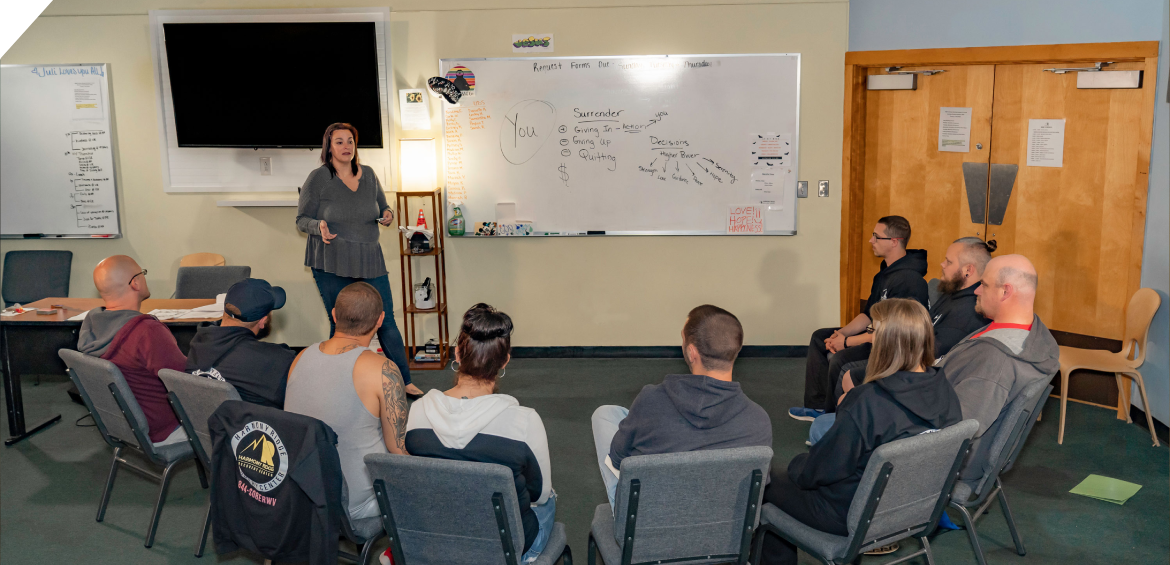The Link Between Domestic Violence And Substance Abuse
Addiction and domestic violence often intertwine, creating a complex and harmful cycle. At Harmony Ridge, we provide specialized support and resources to address both issues.
Dealing with domestic violence is painful and destructive. When you combine this dangerous pattern with drugs and alcohol, you put yourself at risk of serious injury, psychological damage, and even death. Domestic violence and substance abuse are an all-too-common combination. We’ll help you understand more about these two behaviors and how you can find treatment for them together.
What Is Domestic Violence?
Domestic violence, also known as “intimate partner violence,” involves a pattern of abusive behavior from one partner to maintain control and power over the other. This can include anything from sexual assault and physical abuse to threats and psychological abuse.
When most people think of domestic violence, they immediately think of physical abuse. However, it can be so much more than that. In the legal sense, domestic violence also includes emotional abuse like malicious attacks on the partner’s self-worth. In other situations, sexual abuse like rape and molestation can also be forms of domestic violence.
Below are a few different forms of domestic violence.
Physical Abuse
Psychological Abuse
Emotional Abuse
Sexual Abuse
Molestation, rape, and treating a partner in a sexually demeaning way are all examples of sexual abuse. The intimate partner might do this to feel like they’re in control. If you experience this, you may experience shock or disbelief. This could lead to the development of anxiety or post-traumatic stress disorder (PTSD).
Some other forms of domestic violence can include:
- Social isolation (discouraging your partner from seeing family members or friends)
- Stalking
- Insulting or shaming you, especially in front of other people
- Forcing your partner to do something against their will
- Telling your partner who you can see and what you can do
- Dictating how your partner dresses, wears their hair, etc.
- Controlling your partner’s finances without their consent (i.e. taking money, refusing to provide money)
- Preventing your partner from making their own decisions
In the legal sense, domestic violence is anything type of harm that can overpower another person and make them fear you.
Causes Of Domestic Violence And Substance Abuse
Substance use disorder can be caused by many things, including family history, poor environment, and stress. People turn to drugs and alcohol because they provide comfort. However, when you frequently do drugs, they end up rewiring your brain so that you need them just to function. This can cause you to act irrationally or even violently act out whenever you use substances. The proof is in the pudding: Almost 80% of domestic violence crimes are drug-related.
Domestic violence in itself usually stems from a desire to control another person. When both partners have substance abuse issues, there’s an even higher risk of domestic violence. One partner might not be able to defend themselves against an attack. He or she might also be too scared to call for help in fear that their partner will fight back physically, financially, or verbally. At this point, it becomes a vicious cycle.
Like substance abuse, domestic violence can lead to severe consequences and damage relationships if left untreated.
Some other causes of domestic violence include:
- Jealousy
- Low self-esteem
- Feeling inferior
- Trouble controlling anger
Effects Of Domestic Violence And Substance Abuse
If you experience domestic violence, the effects can be long-standing. Survivors of domestic violence can become severely depressed and might eventually need residential treatment.
A few complications that can develop after domestic violence include:
- Depression
- Anxiety
- Eating disorders
- Post-traumatic stress disorder (PTSD)
- Substance abuse and addiction
Effects On Children
Domestic violence and substance abuse can have an especially negative impact on children. Even after the abuser has quit using drugs and alcohol, a child can still feel the effects of negative behavior. Trauma can last for years, even when the child grows into an adult. Children have become known as the “silent victims” of domestic violence and substance abuse. This is because they can’t always understand what’s going on when they’re so young.
When children grow up in an abusive home, their young minds are vulnerable to stress and anxiety. As a result, they grow up with brains that are different from those of most of their peers. When they get older, the post-traumatic stress disorder and depression they develop end up hindering their ability to maintain relationships. Many of them can even end up having problems with drugs or alcohol. This is the start of another vicious cycle of abuse.
Domestic Violence: The Numbers
More than 1 in 5 men admitted to using drugs and alcohol before committing a recent or most extreme act of violence. On top of that, domestic violence against female partners is two to four times higher in men with drinking problems than among other men.
Although men can certainly be victims of domestic violence, women, unfortunately, make up 85% of victims. Women with substance use disorder are also more at risk of becoming victims than women who don’t use. In addition, women with abusive partners are also more likely to develop substance use disorder than women in healthy relationships.
Women who have been raped are also more prone to taking substances. They’re about 3 times more likely to use marijuana, about 6 times more likely to use cocaine, and 10 times more likely to use hard drugs like heroin or meth.
How Are Domestic Violence And Substance Abuse Connected?
There is much evidence to support the link between domestic violence and substance abuse. More than 75% of people who undergo treatment for substance use disorder performed violent acts. These include physical assault, using a weapon against another person, and mugging. The rates of these acts were 72% among men and 50% among women.

So, what explains this link between domestic violence and substance abuse? One study found that people more prone to burying their feelings are likely to show violent behavior while under the influence. This is especially common with alcohol. The more someone drinks and doesn’t work out their anger, the more likely they are to exhibit violence.
Alcohol can make drinkers lose self-control and lower inhibitions. For these reasons, it also makes sense that they’d release what they’ve kept inside as well.
In fact, domestic violence and substance abuse have a few characteristics in common:
- Continuing bad behavior despite negative consequences
- Both domestic violence and substance abuse involve shame or denial
- A loss of control
- Both conditions get worse over time
Treatment For Domestic Violence And Substance Abuse
Fortunately, both addiction and domestic violence can be treated. There are rehab centers that can treat both of these conditions at the same time. When both the victim and the abuser are treated, it can result in a happier and healthier quality of life.
Although these conditions can be treated, treatment centers must address them with caution. They should identify the underlying cause of substance abuse, not just the issue itself. The facility should provide a supportive and safe environment that understands the link between domestic violence and substance abuse.
Therapy
Individual therapy will allow you one-on-one time with your mental health counselor. Group therapy gives you a safe space to share your experiences with others who have had similar ones. In family therapy, you and your family (and possibly your abusive partner) can come together and learn how to cope with the addiction and domestic violence you’ve experienced.
Anger Management
If you’re able to better control your anger, your risk of committing domestic violence could decrease.
Domestic Violence Resources
Sometimes it’s too unsafe for you to get help with your partner, and your life (or that of your child) is in danger. In these cases, you can reach out to several crisis lines:
- The National Domestic Violence Hotline: 800-799-SAFE (7233)
- This website also has an online chat available.
- West Virginia Coalition Against Domestic Violence: 304-965-3552
- This is a statewide network of domestic violence programs working to end institutional and personal violence.
- National Sexual Assault Hotline: 800-656-4673 (HOPE)
- National Child Abuse Hotline: 800-4-A-CHILD (422-4453)
Get Help At Harmony Ridge Recovery Center
No one deserves to be abused, and everyone deserves to be in healthy relationships. That includes you. At Harmony Ridge, we can help you understand how substance abuse has affected your life. We’ll then give you the tools to help you deal with dangerous and unhealthy situations. This will lead you on the path to a happier existence.
You’re not alone. Harmony Ridge Recovery Center can help you find the strength to carry on. Don’t wait. Contact us today and get started on your journey.
References:
Jump To Section
Begin Your Journey to Healing Here
Ask me about recovery, I can help you!
Our recovery specialists are standing by 24/7 to help you or your loved one.
Or call us: 



